
Fruit preservation is a key characteristic of the food industry. For that task, various chemicals, etc., are used. One of the primary methods is coating fruits with different chemical compounds. There are multiple views in society about that task. Some people say it`s unhealthy for human consumption.
Social Media Posts
Social media posts are circulating, implying that Tesco fruits(oranges) are unsuitable for consumption due to the coating layers on the outside of the fruits.
Those posts further state that details about coatings can be found on the official Tesco website.
A viral social media post is drawing attention to Tesco’s fresh oranges, claiming they are “not suitable for vegans” and coated with post-harvest chemicals and waxes depending on the country of origin. The post lists countries such as Spain, Israel, Egypt, and Peru, alongside the names of fungicides (e.g., Imazalil, Thiabendazole) and wax coatings (e.g., E904, E914, E903)—implying that non-organic produce may be unsafe or ethically problematic.
We decided to do a fact check on this.
Fact Check
Is it true that Tesco labels some fresh oranges as “not suitable for vegans”? If so, why?
Tesco’s own-brand oranges are indeed marked “NOT SUITABLE FOR VEGANS.” For example, the Tesco product pages for its oranges (e.g. “Tesco Oranges Each” and “Tesco Orange 5 Pack”) explicitly show this warning and list their post-harvest treatments. The details can be found on the official Tesco website here and here. These labels accompany a breakdown of fungicides and waxes by country of origin. In practice, Tesco confirmed the reason: the orange peels are coated with animal-derived wax (shellac from lac bugs or beeswax) after harvest. News outlets report that Tesco attributed the “non-vegan” label on oranges to the use of beeswax coatings on the peel.
In short, Tesco’s statement is accurate: some conventionally grown Tesco oranges have been treated with waxes (including beeswax or shellac) that make their peel unsuitable for a vegan diet. More details can be found in The Guardian and The Grocery Gazette, available here and here.
What are the listed post-harvest chemicals (like Imazalil or Pyrimethanil), and are they approved for use on citrus fruits in the UK/EU?
The listed additives, imazalil, thiabendazole, and pyrimethanil, are synthetic fungicides used to prevent mould on citrus fruits after harvest. They are standard treatments for citrus fruits, such as oranges and lemons. None of these are newly illegal in the UK or EU; in fact, they remain approved with regulated residue limits. For example, the EU allows imazalil on oranges with a maximum residue limit (MRL) of 4 mg/kg. For more details, refer to this Reuters fact check.
European regulators (EFSA) and the UK’s HSE require safety assessments before setting such maximum residue levels (MRLs). Thiabendazole is also still permitted on citrus in the EU. A report from the European Parliament about this issue can be read here. After Brexit, the UK has adopted the same maximum residue levels (MRLs) for imazalil (and other pesticides) as the EU.
In short, these post-harvest chemicals are legal under current EU and UK rules (subject to their maximum residue levels, or MRLs), not newly banned. A fact check done by Reuters over this issue can be read here.
What do waxes like E903 (Carnauba wax), E904 (Shellac), and E914 (Oxidised polyethene wax) contain, and are any of them derived from animal sources?
The waxes listed are glazing agents applied to the fruit’s surface. Their origins are:
– E903 (Carnauba wax): A plant wax from the leaves of the carnauba palm (Copernicia prunifera). It is entirely vegetable-derived (often referred to as “Brazilian wax”), making it a vegan-friendly option. More details about carnauba can be read here
– E904 (Shellac): A resin secreted by the female lac insect. Female lac bugs excrete shellac on tree branches; this is harvested and purified for use as fruit glaze. Because it comes from insects, shellac is an animal-derived product and not vegan. More details can be read here and here.
– E914 (Oxidised polyethene wax): A fully synthetic (petroleum-based) wax. It contains no animal ingredients. More details about it can be read here
In summary, only E904 (shellac) is derived from animals; E903 is plant-based, and E914 is synthetic. (For completeness, note that beeswax (E901) is another insect-based wax sometimes used on fruit, but it is not listed on these Tesco oranges.)
Are these substances used solely on non-organic oranges?
Yes. All three synthetic fungicides listed (imazalil, thiabendazole, and pyrimethanil) are prohibited in organic farming under EU and UK organic standards. Therefore, certified organic oranges would not carry those chemicals. Similarly, organic standards generally prohibit the use of insect- or animal-derived coatings unless specifically approved; in practice, most organic citrus is sold “unwaxed.”
For example, Tesco even sells “Organic Unwaxed Oranges,” indicating no coating is used. Food experts note that vegans wanting to avoid these waxes are advised to “buy organic fruit” since it “has not been treated for preservation”.
In short, chemical treatments and animal waxes are typically applied only to conventional (non-organic) fruit; organic oranges are often left untreated or unwaxed. More details can be read here and here.
Do these treatments pose any verified health or ethical concerns for consumers?
Health and safety: Regulatory agencies have found no evidence of harm at the legally established residue levels. EFSA and UK HSE establish MRLs only after conducting safety assessments. Recent monitoring (UK FSA/HSE) showed that any imazalil or thiabendazole residues found on oranges were either within limits or, if above, still unlikely to pose a health risk given that consumers usually do not eat the peel. For more details, please visit the UK government website.
Indeed, a Reuters fact-check quotes experts stating there are no “special concerns” about imazalil use at current limits. In short, no credible science links these approved treatments on oranges to acute human health hazards. (Rumours of carcinogenicity or leukocytosis stem from limited animal studies and are not reflected in regulatory assessments.)
Vegan/ethical: The only moral issue is that shellac and beeswax are from insects. Vegans object to any animal-derived input. Shellac (derived from lac bugs) and beeswax (extracted from honeycombs) are therefore not vegan-friendly. This is a matter of animal welfare and philosophy, not toxicity.
By contrast, the fungicide chemicals themselves are synthetic and have no animal origin (so no vegan issue). Waxes from plant or mineral sources (E903, E914) are vegan-safe. The “not suitable for vegans” label is about those insect-derived coatings, not about any health risk.
Can fruit coatings be fully removed by washing?
Washing provides limited removal. Standard rinsing reduces surface dirt but cannot fully eliminate wax coatings and fungicides that manufacturers design to be water-resistant. The FDA confirms that fruit waxes remain intact throughout transport and washing processes. Research published in the EFSA Journal demonstrates that shellac and polyethylene waxes bond firmly to fruit surfaces, making complete removal impractical through conventional washing.
However, health authorities note that these residues present minimal health risks for most consumers, as the chemicals primarily remain in the peel rather than the edible portions of citrus fruits.
Comparison with Other Supermarket Brands
All major UK supermarkets use similar post-harvest treatments on conventional citrus. For example, product information for Morrisons oranges lists many of the same chemicals (imazalil, thiabendazole, etc.) and waxes (E904 shellac, E914 polyethene) as Tesco’s listings. Lidl’s own-brand oranges likewise use shellac (Lidl’s Oaklands brand, for instance, includes “E904 – Shellac” on its label). In other words, shellac and wax coatings, as well as these fungicides, are industry standards.
However, labelling differs. Tesco’s packaging is unusual in stating the vegan warning (“NOT SUITABLE FOR VEGANS”). Other retailers typically only include the additive codes in small print (as required by law) and do not flag them as non-vegan on the front.
The grocery industry notes that Tesco itself admits to using shellac as “common practice” across the citrus-packing sector. Vegan consumers are generally advised to opt for organic citrus (available at all supermarkets) as a safe alternative if they wish to avoid insect-derived coatings.
In summary, Tesco is not unique in using these chemicals or waxes – all big UK retailers do – but Tesco is more transparent by adding a vegan-suitability label. More details can be read here.
Conclusion
The claim that Tesco oranges are unsafe due to wax coatings is misleading. According to our investigation, we found that Tesco uses multiple wax layers and other chemical coatings on non-organic fruits, such as oranges, and some of these coatings have animal origins. However, they also offer organic fruits, such as oranges, that are not treated with chemical coatings. Like Tesco, many other supermarket chains in the UK and global chains also use chemical coatings, and this is not a specific issue for Tesco alone. Regulatory agencies approve these chemical coatings, and there are no special health concerns associated with them.

Title:Are Fruits in Tesco Unsuitable to Eat Due to Coating Layers?
Fact Check By: Rashmitha DiwyanjaleeResult: Misleading


